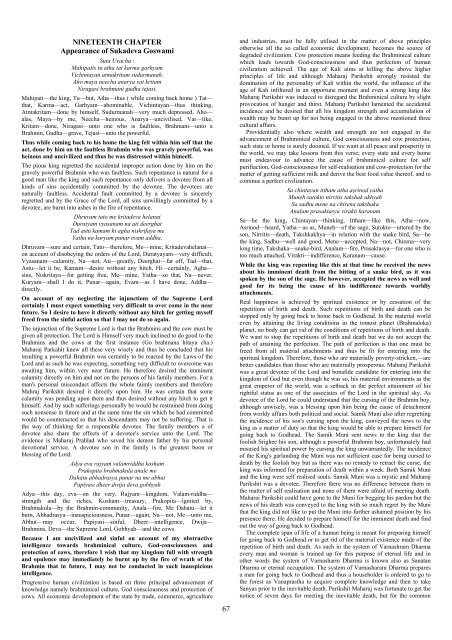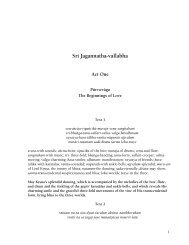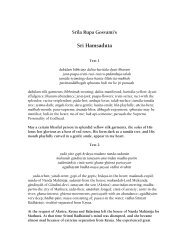Srimad Bhagavatam, Volume 3
Srimad Bhagavatam, Volume 3
Srimad Bhagavatam, Volume 3
Create successful ePaper yourself
Turn your PDF publications into a flip-book with our unique Google optimized e-Paper software.
NlNETEENTH CHAPTER<br />
Appearance of Sukadeva Goswami<br />
Suta Uvacha :<br />
Mahipatis tu atha tat karma garhyam<br />
Vichintayan atmakritam sudurmanah.<br />
Aho maya neecha anarya vat kritam<br />
Niragasi brahmani gudha tejasi.<br />
Mahipati—the king, Tu—but, Atha—thus ( while coming back home ) Tat—<br />
that, Karma—act, Garhyam—abominable, Vichintayan—thus thinking,<br />
Atmakritam—done by himself, Sudurmanah—very much depressed, Aho—<br />
alas, Maya—by me, Neecha—heinous, Anarya—uncivilised, Vat—like,<br />
Kritam—done, Niragasi—unto one who is faultless, Brahmani—unto a<br />
Brahmin, Gudha—grave, Tejasi—unto the powerful.<br />
Thus while coming back to his home the king felt within him self that the<br />
act, done by him on the faultless Brahmin who was gravely powerful, was<br />
heinous and uncivilized and thus he was distressed within himeelf.<br />
The pious king regretted the accidental improper action done by him on the<br />
gravely powerful Brahmin who was faultless. Such repentance is natural for a<br />
good man like the king and such repentance only delivers a devotee from all<br />
kinds of sins accidentally committed by the devotee. The devotees are<br />
naturally faultless. Accidental fault committed by a devotee is sincerely<br />
regretted and by the Grace of the Lord, all sins unwillingly committed by a<br />
devotee, are burnt into ashes in the fire of repentance.<br />
Dhruvam tato me kritadeva helanat<br />
Duratyam vyasanam na ati deerghat<br />
Tad astu kamam hi agha niskrifaya me<br />
Yatha na kuryam punar evam addha.<br />
Dhruvam—sure and certain, Tato—therefore, Me—mine, Kritadevahelanat—<br />
on account of disobeying the orders of the Lord, Duratyayam—very difficult,<br />
Vyasanam—calamity, Na—not, Ati—greatly, Deerghat—far off, Tad—that,<br />
Astu—let it be, Kamam—desire without any hitch, Hi—certainly, Agha—<br />
sins, Niskritaya—for getting free, Me—mine, Yatha—so that, Na—never,<br />
Kuryam—shall I do it, Punar—again, Evam—as I have done, Addha—<br />
directly.<br />
On account of my neglecting the injunctions of the Supreme Lord<br />
certainly I must expect something very difficult to over come in the near<br />
future. So I desire to have it directly without any hitch for getting myself<br />
freed from the sinful action so that I may not do so again.<br />
The injunction of the Supreme Lord is that the Brahmins and the cow must be<br />
given all protection. The Lord is Himself very much inclined to do good to the<br />
Brahmins and the cows at the first instance (Go brahmana hitaya cha.)<br />
Maharaj Parkahit knew all these very wisely and thus he concluded that his<br />
insulting a powerful Brahmin was certainly to be reacted by the Laws of the<br />
Lord and as such he was expecting, something very difficult to overcome was<br />
awaiting him, within very near future. He therefore desired the imminent<br />
calamity directly on him and not on the persons of his family members. For a<br />
man's personal misconduct affects the whole faimly members and therefore<br />
Mahraj Parikshit desired it directly upon him. He was certain that some<br />
calamity was pending upon them and thus desired without any hitch to get it<br />
himself. And by such sufferings personally be would be restrained from doing<br />
such nonsense in future and at the same time the sin which he had committed<br />
would be counteracted so that his descendants may not be suffering. That is<br />
the way of thinking for a responsible devotee. The family members a of<br />
devotee also share the effects of a devotee's service unto the Lord. The<br />
evidence is Maharaj Prahlad who saved his demon father by his personal<br />
devotional service. A devotee son in the family is the greatest boon or<br />
blessing of the Lord.<br />
Adya eva rajyam valamriddha kosham<br />
Prakopita brahmakula anale me<br />
Dahatu abhadrasya punar na me abhut<br />
Papiyasi dheer dwija deva gobhyah<br />
Adya—this day, eva—on the very, Rajyam—kingdom, Valam-riddha—<br />
strength and the riches, Kosham—treasury, Prakopita—ignited by,<br />
Brahmakula—by the Brahmin-community, Anala—fire, Me Dahatu—let it<br />
burn, Abhadrasya—inauspiciousness, Punar—again, Na—not, Me—unto me,<br />
Abhut—may occur, Papiyasi—sinful, Dheer—intelligence, Dwija—<br />
Brahmins, Deva—the Supreme Lord, Gobhyah—and the cows.<br />
Because I am uncivilized and sinful on account of my obstructive<br />
intelligence towards brahminical culture, God-consciousness and<br />
protection of cows, therefore I wish that my kingdom full with strength<br />
and opulence may immediately be burnt up by the fire of wrath of the<br />
Brahmin that in futnre, I may not be conducted in such inauspicious<br />
intelligence.<br />
Progressive human civilization is based on three principal advancement of<br />
knowledge namely brahminical culture, God consciousness and protection of<br />
cows. All economic development of the state by trade, commerce, agriculture<br />
67<br />
and industries, must be fully utilised in the matter of above principles<br />
otherwise all the so called economic development, becomes the source of<br />
degraded civilization. Cow protection means feeding the Brahminical culture<br />
which leads towards God-consciousness and thus perfection of human<br />
civilization achieved. The age of Kali aims at killing the above higher<br />
principles of life and although Maharaj Parikshit strongly resisted the<br />
domination of the personality of Kali within the world, the influence of the<br />
age of Kali infiltered in an opportune moment and even a strong king like<br />
Maharaj Parikshit was induced to disregard the Brahminical culture by slight<br />
provocation of hunger and thirst. Maharaj Parikshit lamented the accidental<br />
incidence and he desired that all his kingdom strength and accumulation of<br />
wealth may be bunrt up for not being engaged in the above mentioned three<br />
cultural affairs.<br />
Providentially also where wealth and strength are not engaged in the<br />
advancement of Brahminical culture, God consciousness and cow protection,<br />
such state or home is surely doomed. If we want at all peace and prosperity in<br />
the world, we may take lessons from this verse; every state and every home<br />
must endeavour to advance the cause of brahminical culture for self<br />
purifiaction, God-consciousness for self-realisation and cow-protection for the<br />
matter of getting sufficient rnilk and derive the best food value thereof, and to<br />
continue a perfect civilization.<br />
Sa chintayan ittham atha asrinod yatha<br />
Muneh sutokto nirritis takshak akhyah<br />
Sa sadhu mene na chirena takshaka<br />
Analam prasaktasya virakti karanam<br />
Sa—he the king, Chintayan—thinking, Ittham—like this, Atha—now,<br />
Asrinod—heard, Yatha—as as, Muneh—of the sage, Sutokto—uttered by the<br />
son, Nirritis—death, Takshkakhya—in relation with the snake bird, Sa—he<br />
the king, Sadhu—well and good, Mene—accepted, Na—not, Chirena—very<br />
long time, Takshaka—snake-bird, Analam—fire, Prasaktasya—for one who is<br />
too much attached, Virakti—indifference, Karanam—cause.<br />
While the king was repenting like this at that time he received the news<br />
about his imminent death from the bitting of a snake bird, as it was<br />
spoken by the son of the sage. He however, accepted the news as well and<br />
good for its being the cause of his indifference towards worldly<br />
attachments.<br />
Real happiness is achieved by spiritual existence or by cessation of the<br />
repetitions of birth and death. Such repetitions of birth and death can be<br />
stopped only by going back to home back to Godhead. In the material world<br />
even by attaining the living conditions in the tomost planet (Brahmaloka)<br />
planet, no body can get rid of the conditions of repetitions of birth and death.<br />
We want to stop the repetitions of birth and death but we do not accept the<br />
path of attaining the perfection. The path of perfection is that one must be<br />
freed from all material attachments and thus be fit for entering into the<br />
spiritual kingdom. Therefore, those who are materially poverty-stricken,—are<br />
better candidates than those who are materially prosperous. Maharaj Parikshit<br />
was a great devotee of the Lord and bonafide candidate for entering into the<br />
kingdom of God but even though he was so, his material environments as the<br />
great emperor of the world, was a setback in the perfect attainment of his<br />
rightful status as one of the associates of the Lord in the spiritual sky. As<br />
devotee of the Lord he could understand that the cursing of the Brahmin boy,<br />
although unwisely, was a blessing upon him being the cause of detachment<br />
from worldy affairs both political and social. Samik Muni also after regretting<br />
the incidence of his son's cursing upon the king, conveyed the news to the<br />
king as a matter of duty so that the king would be able to prepsre himself for<br />
going back to Godhead. The Samik Muni sent news to the king that the<br />
foolish Srighee his son, although a powerful Brahmin boy, unfortunately had<br />
misused his spiritual power by cursing the king unwarrantedly. The incidence<br />
of the King's garlanding the Muni was not sufficient case for being cursed to<br />
death by the foolish boy but as there was no remedy to retract the curse, the<br />
king was informed for preparation of death within a week. Both Samik Muni<br />
and the king were self realised souls. Samik Muni was a mystic and Maharaj<br />
Parikshit was a devotee. Therefore there was no difference between them in<br />
the matter of self realisation and none of them were afraid of meeting death.<br />
Maharai Parikshit could have gone to the Muni for begging his pardon but the<br />
news of his death was conveyed to the king with so much regret by the Muni<br />
that the king did not like to put the Muni into further ashamed position by his<br />
presence there. He decided to prepare himself for the imminent death and find<br />
out the way of going back to Godhead.<br />
The complete span of life of a human being is meant for preparing himself<br />
for going back to Godhead or to get rid of the material existence made of the<br />
repetition of birth and death. As such in the system of Varnashram Dharma<br />
every man and woman is trained up for this purpose of eternal life and in<br />
other words the system of Varnasharm Dharma is known also as Sanatan<br />
Dharma or eternal occupation. The system of Varnasharam Dharma prepares<br />
a man for going back to Godhead and thus a householder is ordered to go to<br />
the forest as Vanaprastha to acquire complete knowledge and then to take<br />
Sanyas prior to the inevitable death. Parikshit Maharaj was fortunate to get the<br />
notice of seven days for meeting the inevitable death, but for the common












